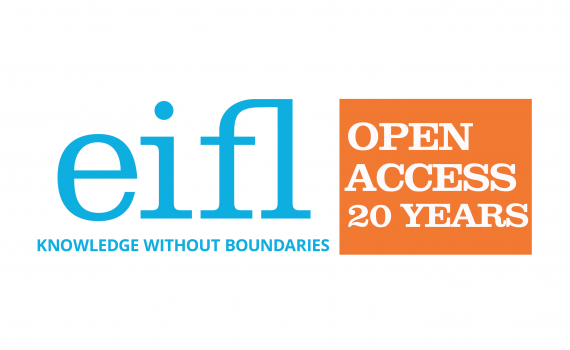
Richard Bruce Lamptey, Librarian at the College of Science Library at Kwame Nkrumah University of Science and Technology (KNUST), and EIFL Country Coordinator in Ghana, reports on the establishment of valuable open access and open science infrastructures across Ghana.
What has changed in open access and open science in Ghana?
There is now greater enthusiasm for open science. Faculty and students are keen to deposit their articles and data in the new institutional repositories. And we have stronger backing from university managements because they are more aware about how showcasing your research affects university rankings.
In 2003, when EIFL first engaged with the Consortium of Academic and Research Libraries in Ghana (CARLIGH), institutional capacity for sharing and publishing research in open access in Ghana did not exist.
Today, 20 years later, universities across Ghana understand the importance of open access and open science and many have established open access repositories and publishing platforms.
How - the processes and dynamics leading to change
In 2008, Kwame Nkrumah University of Science and Technology (KNUST) launched an institutional open access repository - the first in Ghana and in West Africa.
The idea for the repository was planted by KNUST University Librarian, Helena Asamoah-Hassan. Her interest had been sparked at an international conference in the UK in 2006, which she attended in her capacity as EIFL Coordinator in Ghana.
The idea became real through a series of awareness-raising and capacity building workshops over the next couple of years (2006 - 2008). The workshops were organized by CARLIGH with partners, including EIFL and INASP (the International Network for the Availability of Scientific Publications). Librarians, faculty and technical (IT) staff from universities and research institutions across Ghana took part in the workshops, which raised awareness about the benefits of open access for research and introduced ideas for open access infrastructures - repositories and journal publishing platforms. IT specialists gave input on the free and open source software needed to set up infrastructures. There was discussion about the important role of open access policies in making open access the norm at institutions.
The first open access policy
KNUST was also the first university in Ghana to introduce policy mandating open access to theses and dissertations. Later, KNUST extended the open access policy to cover all research outputs.
The repository is deeply embedded in KNUST’s workflows and plays a significant role in assessment and promotion of researchers. As part of the promotion criteria for faculty members, it is required that the library does a report on the verification of research papers and indicates the link to the publications deposited on the institutional repository.
Since 2008, open access in Ghana has flourished -
- 27 more institutions have established institutional repositories
- 19 institutions now have the capacity to install and manage Open Journal Systems publishing platforms, and six of these have already begun publishing and hosting institutional journals
- The Council of Scientific and Industrial Research of Ghana (CSIR), the body mandated by the government to carry out research for national development, has adopted an open access policy that makes the vast amount of knowledge its scientists have generated over several decades openly available online.
- CARLIGH has established a technical team to provide ongoing support for the advancement of open access and open science in Ghana.
EIFL supported this expansion in many different ways. In 2011, EIFL supported the very first national open access awareness raising meeting, which was attended by over 100 people - heads of tertiary institutions, directors of government ministries and agencies, and researchers and librarians from Ghana and other African countries. EIFL also supported an advocacy campaign to create awareness about how open access institutional repositories benefit scholarship and research.
Since 2011 there have been numerous events and activities to raise awareness about open access and open science, to promote the creation of open access institutional repositories, and to encourage open access publishing, open research data sharing and the development of open science policies.
EIFL has provided resource people to build capacity and supported international exchange visits to help librarians keep up to date with the latest developments in open access and open science, and has also supported ongoing awareness raising and advocacy.
CARLIGH members frequently organize events during annual Open Access Weeks. For example, in 2019 the University of Cape Coast held three different events - a workshop, a walk and a talk on radio. EIFL often participates in these events, by joining in workshops and webinars and by providing publicity.
Keeping up momentum during the COVID-19 pandemic
When gatherings were banned, and institutions were forced into lockdown during the COVID-19 pandemic (2020), EIFL helped CARLIGH to keep up momentum for open access by co-hosting a series of capacity building webinars covering a variety of topics - research data management, open access publishing, management of institutional repositories. EIFL also co-hosted online meet-ups for the growing numbers of open science trainers at CARLIGH member institutions.
Just last year (2022), with EIFL’s support, CARLIGH helped to establish seven new institutional open access repositories and to improve nine repositories. Through workshops and training, CARLIGH also strengthened understanding of open access journal publishing at 19 institutions, most of which have taken steps to install Open Journal Systems software (OJS) and have begun publishing and hosting institutional open access journals.
Recent research (1) shows that theses and dissertations are still the most deposited documents by public universities in Ghana. This can be attributed to the fact that public universities have mandatory deposit policies for theses and dissertations, and Graduate Schools provide repositories with copies of submitted thesis annually.
However, even with policies in place for depositing of journal articles, faculty remain a bit passive and most of the time librarians have to look for faculty publications and deposit them. University management support is required to increase the deposit rates and to ensure smooth operation and management of institutional repositories.
The future: CARLIGH plans for OA/open science
CARLIGH would like to develop research data management systems in institutions of higher education to help them to provide practical guidance, support and training for researchers to practice open science, ensure reproducibility of data and research and share and preserve data for future generations. This will significantly contribute to the responsible and sustainable conduct of research in Ghana.
More about EIFL’s support for open access in Ghana.
(1) Imoro, O. and Saurombe, N. (2023), "Institutional repository infrastructure: a survey of Ghanaian public universities", Collection and Curation, Vol. ahead-of-print No. ahead-of-print. https://doi.org/10.1108/CC-11-2022-0038
Read more
About EIFL’s support for open access and open science in Ghana.
SHARE / PRINT







